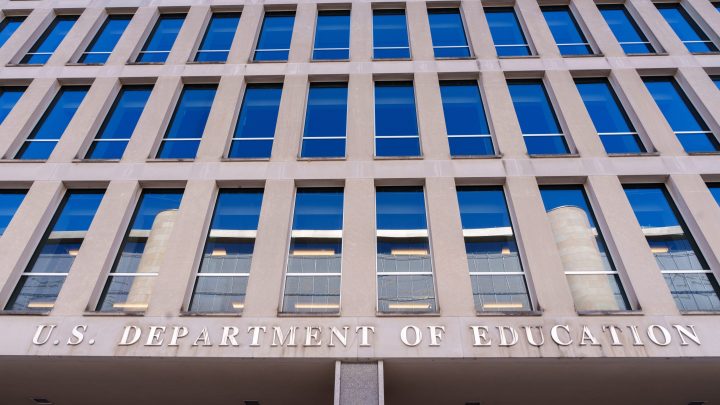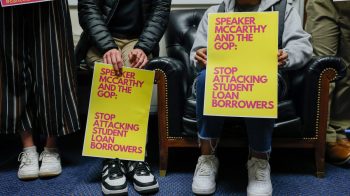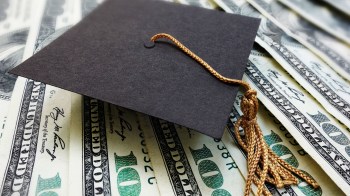
Have student loans? Want forgiveness? An important deadline is coming up.
Have student loans? Want forgiveness? An important deadline is coming up.

A big deadline is coming up for people with federal student loans to be eligible for forgiveness.
Borrowers with certain kinds of federal loans need to consolidate — effectively, refinance with the federal government — by Tuesday, April 30, to qualify for debt cancellation through two existing programs, Income-Driven Repayment and Public Service Loan Forgiveness.
The Department of Education is currently doing what it calls a one-time account adjustment, reviewing every single one of the more than 40 million federal student loan accounts and giving borrowers credit for years of past payments that previously did not count toward forgiveness.
“Essentially what it’s saying is, ‘Listen, we don’t think that the industry as a whole did a good job communicating to borrowers about the existence of the Income-Driven plans,’” said Betsy Mayotte, who runs the nonprofit Institute of Student Loan Advisors.
Income-Driven Repayment plans have been around in some form since the mid-1990s. They allow people with federal student loans to make monthly payments based on their income. Because those payments are often lower than they would be on a standard 10-year repayment plan, it generally takes longer to repay the whole loan.
“But one of the things that’s baked into these IDR plans is that if you’re on them for either 20 or 25 years and you still have a balance, they forgive the balance,” said Mayotte.
People who work in public service or nonprofit jobs can have their remaining balance forgiven after 10 years on an Income-Driven Repayment plan through the Public Service Loan Forgiveness program, which has been around since 2007.
At least that’s how it’s supposed to work. In reality, though, until recently, very few people were actually getting that forgiveness.
“Decades of loan servicing mistakes and systemic failures across the federal student loan program had prevented most borrowers from getting credit for all of their time in repayment,” said Abby Shafroth, co-director of advocacy at the National Consumer Law Center. “Meaning that borrowers were stuck in debt when they should have been eligible for loan forgiveness.”
The Joe Biden administration is trying to fix those past mistakes by retroactively giving borrowers credit for years they may have spent in deferment, forbearance or the wrong kind of repayment plan. Nearly a million people have already had their loans forgiven through IDR, and nearly 900,000 have had their debt canceled through PSLF. Many more are years closer.
But not everyone with federal loans is currently eligible for this account adjustment.
“You need to have the right type of loan to get your debt canceled under Income Driven Repayment,” said Mike Pierce, executive director of the nonprofit Student Borrower Protection Center.
A lot of people don’t. Only direct loans — made by the Department of Education — qualify.
“Older loans made by Sallie Mae or made by Citibank or other big banks back before 2010, they didn’t have the same rights and protections that are available to people that have newer loans made by the federal government,” Pierce said. “So to be able to take advantage of these debt relief opportunities, you need to turn your older loan into a loan made by the federal government.”
That can be done by consolidating any nondirect loans you have by Tuesday. That includes commercially held Federal Family Education loans, Perkins loans, Parent Plus loans and Health Education Assistance loans. People who have loans from both undergrad and graduate school can also get years closer to forgiveness on their graduate school loans by consolidating.
But a lot of people who could benefit from this temporary fix still don’t realize it.
Jordan Pope-Roush hadn’t heard about any of this until recently, when a friend who works on student loans learned that he still had about $60,000 in debt from college and grad school that he’s been carrying since the mid-2000s.
“I went to two private schools for undergrad and then for graduate school, and they both were very expensive,” said Pope-Roush, a comedy writer and screenwriter in Cincinnati. “And I took out loans mostly to pay for both of them.”
He attended Emory University, then the University of Southern California for his MFA in screenwriting.
“I think when I finished USC, I want to say I owed, like, $130,000 total,” he said. “Which was, as I was told many times when I was 18 and starting to take out all these loans, ‘good debt.’”
Now, he’d say emphatically, there is no good debt. At 42, he’s still paying those student loans.
But recently Pope-Roush’s friend told him that if he consolidated his loans — all of which he took out before 2010 — he would be eligible for this one-time account adjustment. Then he would likely only have to pay for a few more years before the rest of his debt is forgiven.
If she hadn’t told him, and pushed him to do the paperwork, he said, he never would’ve known.
“There has been very little direct outreach to borrowers,” said Jane Fox at the Association of Legal Aid Attorneys UAW Local 2325. “In the sense of a communication from the Department of Education sent directly to you. An email that said, ‘Hey, we have identified you as somebody who could benefit from this. Here are the steps you need to take, here’s the deadline, here’s where to go.’ That hasn’t really happened.”
The Department of Education declined to comment.
For anyone who’s not sure what kind of loan they have or if they might benefit from consolidation, now is the time to find out.
“Generation X, elder millennials, the people who are really going to be impacted by the IDR account adjustment, take the 10 minutes to look into this, to make a phone call, to go on StudentAid.gov,” Fox said. “Because chances are, they probably qualify for some form of relief that they’re not aware of.”
There’s a lot happening in the world. Through it all, Marketplace is here for you.
You rely on Marketplace to break down the world’s events and tell you how it affects you in a fact-based, approachable way. We rely on your financial support to keep making that possible.
Your donation today powers the independent journalism that you rely on. For just $5/month, you can help sustain Marketplace so we can keep reporting on the things that matter to you.

















